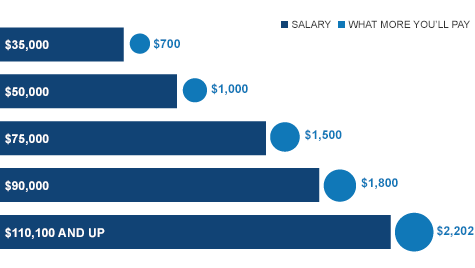NEW YORK (CNNMoney) -- For all the uncertainty over how lawmakers will handle the expiring tax cuts under the fiscal cliff, there seems to be growing clarity surrounding at least one measure: the temporary 2% payroll tax cut.
Bottom line: It's likely toast.
"Nobody is a champion for it," said Sean West, the U.S. policy director for the Eurasia Group.
That isn't necessarily surprising, since the payroll tax cut -- worth 2% of one's wages up to $110,100 -- was intended to be a temporary way to boost the economy. It was put in place for one year in 2011 but was then extended for this year.
During that time, the measure has saved most of the country's 160 million workers anywhere from $700 to $1,800 a year.
The payroll tax funds Social Security. The tax cut costs roughly $120 billion a year, but rather than let Social Security funding suffer, the Treasury Department has made the program whole with money from general funds. Translation: It's adding to the country's deficit.
At the same time, letting it expire will take money out of workers' paychecks while the economic recovery is still tempered.
Related: How Obama and Romney would handle the fiscal cliff
The Congressional Budget Office has noted that the payroll tax cut's expiration, in combination with the end of extended unemployment benefits, would represent "significant sources of fiscal tightening" next year. (Related: CBO warns of fiscal cliff recession)
And a majority of economists recently surveyed by the National Association for Business Economics indicated they do favor another year-long extension.
But on Capitol Hill, no one from either party has really pushed for another year of the tax cut.
And the White House has been noncommittal. "We'll evaluate the question of whether we need to extend it at the end of the year when we're looking at a whole range of issues," White House spokesman Jay Carney said in early September.
House Minority Leader Nancy Pelosi did allow last week that she won't advocate for an extension and said it's time to think about reforming the tax code.
But, she added, "I could be convinced if [a payroll tax cut extension] was part of something that advanced our economy down the road."
As big a tax break as the payroll tax cut may represent to individuals, it pales in political magnitude to the pending expiration of the Bush tax cuts, which promise once again to suck up most of the oxygen when Congress returns to work in mid-November.
"Perhaps there's a small chance [President] Obama would take a payroll extension as a sweetener in a deal where he gets re-elected with a weak mandate and can't get other things he wants," Eurasia Group's West said. "But that's a lot of ifs."

No comments:
Post a Comment